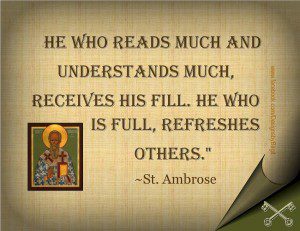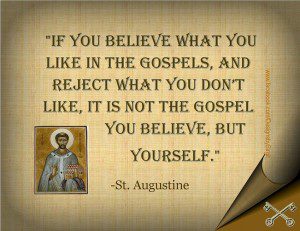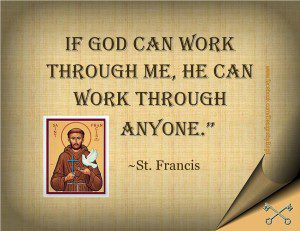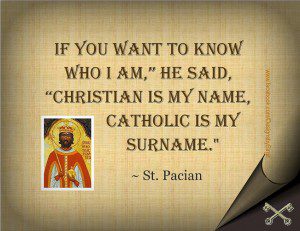 I was recently speaking to a friend after Mass. This mother of five was raised Methodist but is now Catholic, and said she believes Catholic children must be taught Bible stories (like Daniel and the lions’ den) by their parents or they won’t learn them at all. My mother and disagreed, because we know Catholic children do learn Bible stories at Mass, CCD, and Catholic school, but we agreed it’s still primarily the parents’ job to ensure their children know their Bibles.
I was recently speaking to a friend after Mass. This mother of five was raised Methodist but is now Catholic, and said she believes Catholic children must be taught Bible stories (like Daniel and the lions’ den) by their parents or they won’t learn them at all. My mother and disagreed, because we know Catholic children do learn Bible stories at Mass, CCD, and Catholic school, but we agreed it’s still primarily the parents’ job to ensure their children know their Bibles.
Catholics get a bad rep for not being Biblically-literate. However, the opposite is actually true. As Catholics, we are afforded the opportunity to hear nearly the entire Bible proclaimed over a three-year period. We hear two Bible stories during each weekday Mass, three stories on Sundays and Holy Days, and LOTS during Easter liturgies. The difference is, presentation of Biblical readings in the Catholic Church does NOT depend on the pastor’s preference; the Church adheres to its schedule regardless of current events or pastor changes. The Church generously presents the entire Bible to its faithful.
 With that said, it’s still critically important for Catholics who can’t attend daily Mass to pick up their Bibles and read them outside the Mass. As Catholics, we have a limited right of private interpretation, which simply means we can’t decide our Bible is teaching something contrary to the Catholic faith. But we are encouraged to know our faith and what better way to learn about the faith than to know its history as presented in the Bible?
With that said, it’s still critically important for Catholics who can’t attend daily Mass to pick up their Bibles and read them outside the Mass. As Catholics, we have a limited right of private interpretation, which simply means we can’t decide our Bible is teaching something contrary to the Catholic faith. But we are encouraged to know our faith and what better way to learn about the faith than to know its history as presented in the Bible?
Fortunately, we also know we have more than just the Bible to explore when learning about our Catholic faith; the writings of the Church fathers, the saints, and the Magisterium, as well as the Catechism, provide rich spiritual readings for us. It’s our responsibility to seek out these sources to understand points of faith that confuse or challenge us. Sometimes merely speaking with someone else about a particular scripture will clarify a point, but other times we must do our own research into the whys, whats, whos, hows, and wheres of the faith. Having all theses sources available to us–especially in this age of digital media–means we can ALL be scholars and investigate our faith to the fullest.
 My children are still a bit too young to ask the hard questions, but I am already reading Bible stories to them (they have at least three Bible story books), taking them to Mass (trying to help them learn, too, not just keeping them quiet), and praying with them daily. My husband, on the other hand, constantly challenges me to be a better Catholic by word, deed, and thought. And while I can easily preach to our children, with him I must “preach the Gospel at all times and when necessary, use words,” as St. Francis said. This can be difficult for me since I am a very outspoken person, but I’ve found it’s more effective for me to keep my words brief and live out my faith so that my husband and others will witness our Catholic faith most fully.
My children are still a bit too young to ask the hard questions, but I am already reading Bible stories to them (they have at least three Bible story books), taking them to Mass (trying to help them learn, too, not just keeping them quiet), and praying with them daily. My husband, on the other hand, constantly challenges me to be a better Catholic by word, deed, and thought. And while I can easily preach to our children, with him I must “preach the Gospel at all times and when necessary, use words,” as St. Francis said. This can be difficult for me since I am a very outspoken person, but I’ve found it’s more effective for me to keep my words brief and live out my faith so that my husband and others will witness our Catholic faith most fully.
 I admit that sometimes I fall short in my scholarly responsibilities. I am also occasionally blind to areas of the faith that don’t interest or come easily to me. But there are other I am constantly exploring. As wife to a yet-to-be-confirmed convert and mother to two precocious children, it is my especial responsibility to know my faith thoroughly, or at least to know where to turn when questions arise. It is all of our responsibilities, as St. Peter confirms, to be ready to “make a defense to everyone who asks you to give an account for the hope that is in you, yet with gentleness and reverence “(1 Peter 3:15).
I admit that sometimes I fall short in my scholarly responsibilities. I am also occasionally blind to areas of the faith that don’t interest or come easily to me. But there are other I am constantly exploring. As wife to a yet-to-be-confirmed convert and mother to two precocious children, it is my especial responsibility to know my faith thoroughly, or at least to know where to turn when questions arise. It is all of our responsibilities, as St. Peter confirms, to be ready to “make a defense to everyone who asks you to give an account for the hope that is in you, yet with gentleness and reverence “(1 Peter 3:15).
